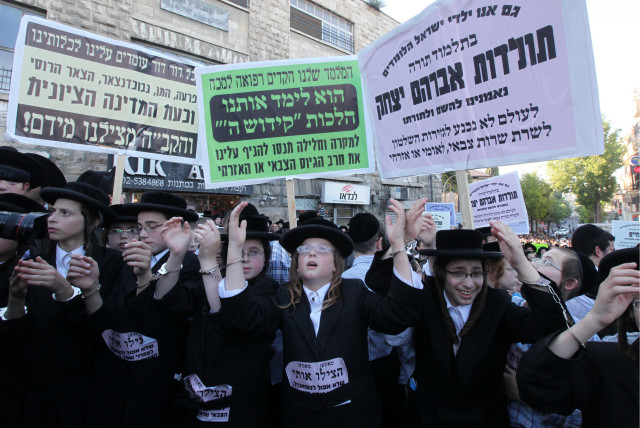Israel's new haredi draft exemption proposal is an ethical travesty

Controversy looms over lowering the age of military exemption for Israel's yeshiva students.
This year on Yom Hashoah (Holocaust Martyrs’ and Heroes’ Remembrance Day), the contentious issue of Haredi (ultra-Orthodox) military conscription sparked an intense public debate in Israel. Controversial as the timing may be, one cannot deny it holds significant symbolic importance. The debate was accompanied by practical implications, ignited by the government’s proposal to lower the exemption age for Haredi yeshiva students from 26 to 21, in effect exempting them from military service altogether.
Before delving into the specifics of the government’s proposed legislation, it is important to clarify why Yom Hashoah, which is commemorated the week before Yom Hazikaron (Remembrance Day for Israel’s Fallen), became a poignant time for this decades-long debate to surface once again. The exemption itself dates back to the establishment of the state, and the popular version of the story is attributed to David Ben-Gurion. During the War of Independence, exemptions were already being granted to yeshiva students. Ben-Gurion’s initial willingness to forgo the conscription of yeshiva students stemmed from the desire to preserve the yeshiva world in the wake of the destruction of Jewish communities during the Holocaust. After being convinced that the exemption was essential for the preservation of the Torah world, which had almost disappeared during the Holocaust, Ben-Gurion agreed to it.
In a letter issued by the conscription authority to the heads of the Chief Rabbinate and the yeshiva committee, it was determined that a three-month deferment should be given “to yeshiva students whose Torah is their profession.” The deal around the exemption with the ultra-Orthodox was clear. There were about 400 recipients of the exemption at the time, and they would dedicate their days and nights to studying Torah and thus would not be drafted into the army.
In Ben-Gurion’s words, “The exemption applies only to yeshiva students who study Torah... as long as they are studying Torah.”
However, just two months after the exemption was granted, Rabbi Yitzhak HaLevi Herzog, who would later become Israel’s chief rabbi, filed a lawsuit to prevent sanctions on yeshiva students who did not enlist. Herzog wrote to the government, “I will come out against you in a public and sharp protest, before the eyes of all Israel. You have no authority to use such drastic coercion against the remnant of the exiles who maintain our holy Torah in Jerusalem.” Here is a straight line from Ben-Gurion’s reasoning to our present-day debate on Yom Hashoah.
Ben-Gurion himself recognized the complexity of the exemption he had authorized. In a letter to Rabbi Herzog in 1958, he wrote, “the matter... is not so simple. When I exempted yeshiva students from military service ten years ago, their number in the army was small, and as I was told then, this was the only country where Torah scholars remained for its own sake.” He added, “I cannot find in the Torah, or in the prophets or in the writings, that Torah students were exempt from defending the homeland.” Ben-Gurion demanded that yeshiva students undergo a basic three-month training so that they could be conscripted during wartime. The Haredim rejected the demand.
The opportunity to anchor and expand the exemption for Haredi leadership came decades later during Menachem Begin’s tenure as prime minister. According to a report submitted to the Knesset, the number of students exempt from military service increased each year by a few hundred. The expansion of the exemption from Begin’s tenure was seen as a way to appease the Haredim, who had requested and received their demand that there be no limit on the number of yeshiva students who can receive a deferral from military service based on their status as Torah scholars. As a result of this, not only Haredi yeshiva students could receive a deferral but also graduates of National Religious institutions.
There is no simple answer to the question of why this happened. Why did the government decide to give the Haredim everything they wanted? One possibility is political need, which blinded it to the future implications of the exemption. Another possibility is that at the time, the memory of the Holocaust still loomed large, and the government acted from motives similar to those of Ben-Gurion. A third possibility is that the government could not have known that so many Haredim would make use of the exemption. During that period, many more Haredim enlisted in the IDF, and the clear and uncompromising norm that those who go to the army are a damaged commodity had not yet taken root in the Haredi community, compared to those who remained in yeshiva.
How will the haredi draft exemption get worse?
The government’s new proposed legislation will worsen the equation of this exemption. While the current scope of the exemption from military service for Torah students based on the principle of “their Torah is their profession” is problematic, one could argue that it holds some ethical justification in a Jewish state. However, the new basis for the exemption – “their religiosity is their profession” – is an ethical travesty.
The proposed exemption framework has the potential to create adverse effects on the State of Israel. The framework recommends compensating IDF soldiers in return for a comprehensive exemption of the Haredim from military service. In general terms, the arrangement offers a “you serve, you get” formula. The higher the “quality” of one’s military service, the longer one’s service will be – and the more generous the compensation. If you’re a clerk, your service will be short and you’ll get a standard military salary. If you’re a fighter in the Caracal Battalion, you’ll serve for a longer period and be showered with financial benefits. A minimum wage for service, study and apartment purchase benefits and more.
All this wonderfulness is, in essence, hush money. In exchange for it, the IDF and the Defense Ministry are willing to advocate lowering the Haredi exemption age, such that the Haredim will effectively be exempt from military service altogether. The non-Haredim will serve, while their sense of injustice and of unequal treatment will be numbed by government money. This is a perfect trade-off for this government.
Exempting haredim from the IDF is a bad deal for Israel's economy
Among the proposal’s supporters are those who cannot be suspected of disregarding equality. They admit the deal stinks but take a realpolitik approach: Past attempts to draft the Haredim have failed, so it’s better to pursue the “real” than the “ideal.” The significant benefit to Israel, they reassure themselves, is that the Haredim will join the labor market. According to them, if the Haredim are exempted from military service, they’ll abandon their yeshivot and enter the workforce – and Israel’s GDP will skyrocket. But this is incorrect on all counts. It’s a bad deal in terms of values but also from a cost-benefit perspective, as it is based on faulty assumptions.
Haredi labor market participation will not be able to finance this budgetary burden. The employment gap primarily affects Haredi men, who in yeshiva study only Torah. Even those among them who choose to enter the workforce find it difficult to secure quality employment due to not having studied the core curriculum. In fact, because of the money they receive from the state to sit and learn in yeshiva, their incentive to go to work is so low that they often find it just not worth it to do so.
To cast aside any speculation about the aforementioned, the government recently issued the first draft of the budgetary document outlining the distribution of coalition funds, revealing an unprecedented allocation of billions of shekels to ultra-Orthodox communities. Yeshivas will receive an additional NIS 3.7 billion during 2023-2024. Furthermore, an extra NIS 1.18 billion will be allocated for teachers in ultra-Orthodox schools not recognized by the Education Ministry, and they will be exempt from teaching the core curriculum. The food voucher program promoted by Shas leader Arye Deri will be allocated a budget of NIS 850 million by the end of 2024.
In 20 years, Haredim are projected to constitute about 27% of Israeli citizenry. Unless there is a drastic change in their way of life, they will continue to pay minimal taxes while receiving substantial allowances and benefits. In this scenario, who will fund the increased security burden and the economic burden, which will be significantly greater than the current situation?
Indeed, the question of equality in economic burden sharing is complex, and there is no simple solution in sight. However, any blanket military exemption for the Haredim based on such a share cannot rely solely on increasing funding for those who do serve, while continuing and likely expanding extensive state funding for those who don’t. In other words, any exemption should be conditional upon the complete cancellation of benefits funded by the state for the Haredim: no government-funded social security, no state-funded pension, no tax-funded housing subsidies, grants, or specialized education curricula. One group cannot simultaneously have its separate curriculum, refuse any form of public duty for the benefit of the collective, and expect the public to subsidize their entire livelihood by bearing the economic burden. This approach is the only way to increase Haredi labor market participation.
The only way to sustain the State of Israel is to insist on meaningful contributions from everyone, including core studies and employment training, equal sharing of the economic burden, and adherence to our values, with equality being a paramount value. Collective contribution is, after all, a cornerstone of Zionist values. ■
Jerusalem Post Store
`; document.getElementById("linkPremium").innerHTML = cont; var divWithLink = document.getElementById("premium-link"); if (divWithLink !== null && divWithLink !== 'undefined') { divWithLink.style.border = "solid 1px #cb0f3e"; divWithLink.style.textAlign = "center"; divWithLink.style.marginBottom = "15px"; divWithLink.style.marginTop = "15px"; divWithLink.style.width = "100%"; divWithLink.style.backgroundColor = "#122952"; divWithLink.style.color = "#ffffff"; divWithLink.style.lineHeight = "1.5"; } } (function (v, i) { });

